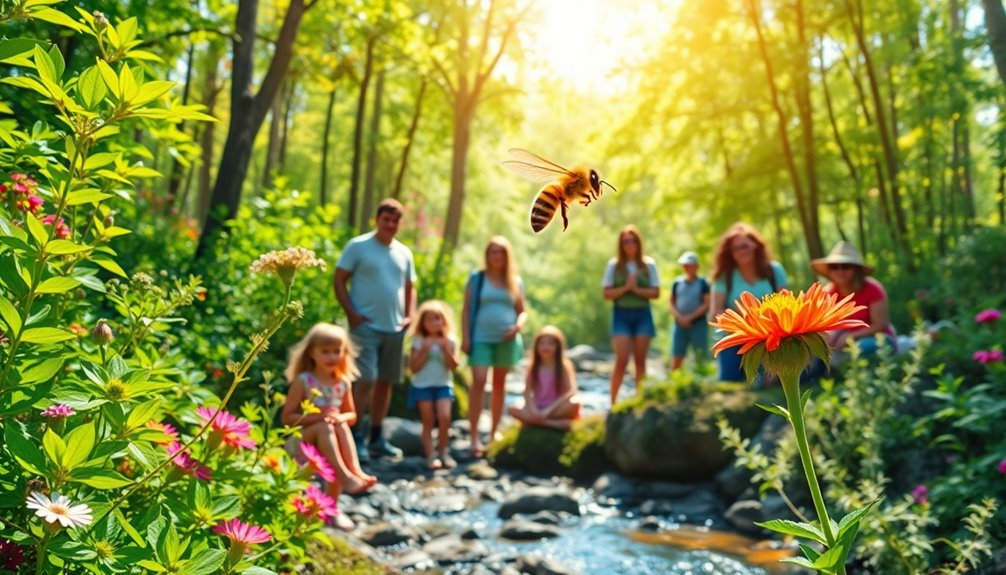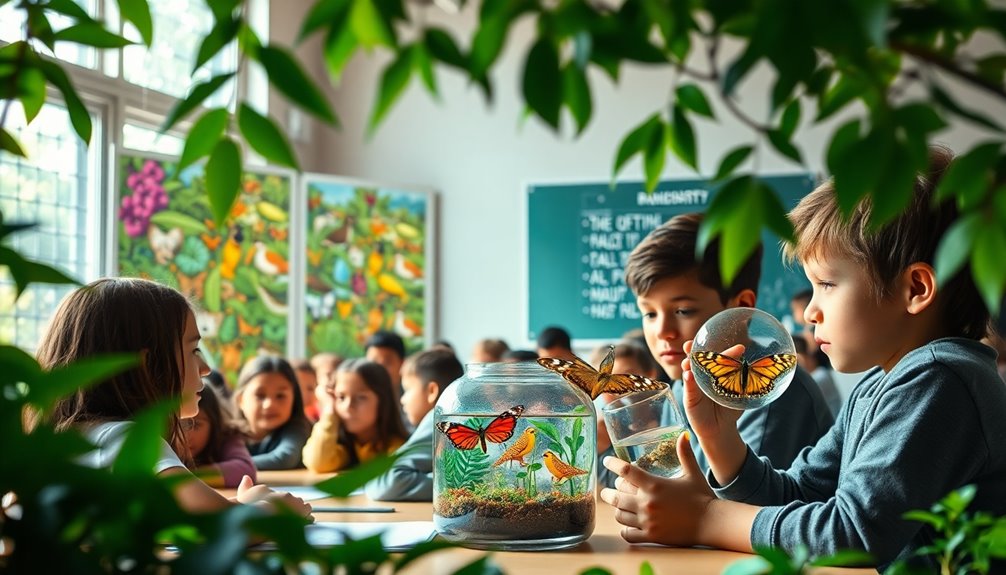Biodiversity offers several essential social benefits you need to know. To begin with, it enriches cultural identity, connecting communities to their natural heritage. In addition, engaging with nature promotes mental well-being, reducing anxiety and boosting creativity. Finally, thriving ecosystems enhance community resilience, helping areas bounce back from environmental challenges. Together, these benefits strengthen social bonds and foster a deeper connection to the environment. There's so much more to explore about how biodiversity shapes our lives and communities.
Key Takeaways
- Biodiversity enriches cultural traditions and community identity, serving as symbols of heritage and pride for local populations.
- Engaging with nature through outdoor activities fosters social connections and enhances perceived support among community members.
- Diverse ecosystems contribute to mental health by reducing anxiety and enhancing focus, leading to improved community well-being.
- Biodiversity supports food security, ensuring a variety of crops and livestock for balanced diets, which strengthens community resilience.
- Educational opportunities from biodiversity promote awareness and sustainable practices, empowering communities to protect natural resources for future generations.
Understanding Biodiversity and Its Importance

Biodiversity is the lifeblood of our planet, encompassing the vast variety of species, ecosystems, and genetic differences that sustain natural processes. It provides essential ecosystem services like food production, water purification, and climate regulation, all fundamental for your well-being.
When you think about biodiversity, consider its cultural significance; the unique plants and animals around you shape community traditions and inspire art.
Additionally, biodiversity drives economic benefits through tourism and recreation, attracting visitors enthusiastic to experience nature's wonders.
By understanding biodiversity's importance, you recognize its role in maintaining the balance of our environment and supporting sustainable development.
Preserving diverse ecosystems guarantees these important resources are available for you and future generations to enjoy.
Cultural Benefits of Biodiversity

When you explore the cultural benefits of biodiversity, you'll find that many communities have deep spiritual connections to their local ecosystems.
These relationships shape cultural traditions, practices, and a strong sense of identity, fostering pride in local heritage.
Spiritual Connections to Nature
How do spiritual connections to nature influence cultural identity? For many indigenous cultures, these connections are essential, as they see local ecosystems as sacred. Specific species often embody cultural values, appearing in rituals and folklore, which fosters community belonging.
Biodiversity provides unique landscapes significant for cultural ceremonies and gatherings, reinforcing your identity. However, when biodiversity declines, these spiritual connections weaken, threatening the flora and fauna crucial for your cultural narratives.
Recognizing the importance of these connections is key for conservation efforts. It emphasizes the need to preserve not just the species but also the traditions and identities tied to them.
Cultural Traditions and Practices
Spiritual connections to nature weave deeply into the fabric of cultural traditions and practices, illustrating the profound relationship between ecosystems and community identity. Many indigenous communities rely on local biodiversity for traditional medicines, as specific plants and animals play vital roles in healing practices and cultural narratives. This connection fosters a sense of belonging and pride, as local flora and fauna enrich their customs and stories.
| Cultural Elements | Biodiversity Influence |
|---|---|
| Rituals | Specific wildlife species |
| Celebrations | Unique plant life |
| Traditional crafts | Local artistic expressions |
| Healing practices | Medicinal plants |
| Folklore | Stories tied to ecosystems |
Community Identity and Pride
Biodiversity plays an essential role in shaping community identity and pride, as local species often serve as symbols of cultural heritage. When you connect with the unique flora and fauna in your area, you foster a sense of belonging that strengthens your community identity.
Indigenous peoples, for instance, view ecosystems as crucial to their cultural heritage, creating deep spiritual connections that enhance their sense of pride. Specific species often appear in cultural stories and rituals, underscoring their importance in community narratives.
Furthermore, art, music, and festivals celebrate biodiversity, highlighting how local species influence cultural practices. By preserving biodiversity, you help maintain the richness of your community's cultural heritage and guarantee that these identities thrive for generations to come.
Recreational Opportunities and Mental Health

Nature offers incredible therapeutic benefits that can boost your mental health.
By engaging in outdoor activities like hiking or bird watching, you not only enjoy the beauty around you but also reduce stress and enhance your mood.
Exploring diverse ecosystems can lead to a greater sense of happiness and life satisfaction, making it essential for your well-being.
Nature's Therapeutic Benefits
When you immerse yourself in outdoor activities like hiking or bird watching, you're not just enjoying the scenery; you're also tapping into powerful mental health benefits. Nature's therapeutic benefits greatly boost your mental well-being. Studies show that spending time in natural environments reduces anxiety by 30%, enhances attention, and improves memory retention by 20%. Ecotourism promotes happiness, with 85% of participants feeling uplifted after engaging in nature-based experiences. Additionally, outdoor activities foster social connections, increasing perceived social support by 50%. Engaging with nature also enhances executive function, which is essential for managing emotions and making decisions.
| Benefit | Statistic | Impact |
|---|---|---|
| Anxiety Reduction | 30% decrease | Improved mental health |
| Enhanced Attention | 20% increase | Better cognitive function |
| Happiness from Ecotourism | 85% report increased joy | Boosted life satisfaction |
| Social Support | 50% increase | Stronger community ties |
| Overall Well-Being | 40% increase | Enhanced life satisfaction |
Outdoor Activities Engagement
Engaging in outdoor activities offers a unique opportunity to enhance your mental health and well-being, especially in biodiverse environments.
Whether you're hiking through lush forests, bird watching in vibrant ecosystems, or participating in eco-tourism, these experiences allow you to connect with nature and rejuvenate your spirit.
Natural parks and reserves, bustling with diverse life, draw millions each year, encouraging physical activity and fostering mental wellness.
Research shows that spending time in these settings can greatly reduce stress, anxiety, and depression.
Plus, being in nature boosts creativity and cognitive function, enhancing your overall quality of life. Additionally, healthy ecosystems provide essential services such as clean air and contribute significantly to our mental well-being.
Biodiversity's Role in Food Security

Biodiversity plays an essential role in ensuring food security, as it provides the variety of crops and livestock crucial for a balanced diet. The diverse agricultural systems foster resilience to pests and diseases, reducing the risk of crop failures and food shortages.
When you support biodiversity, you're also enhancing agricultural productivity, since genetic diversity in crops and livestock allows for the development of varieties that can withstand climate change impacts.
Additionally, approximately 75% of global food crops rely on animal pollination, emphasizing how biodiversity contributes to maintaining healthy ecosystems.
By protecting biodiversity, you're not only securing diverse food sources but also ensuring stable food supplies for future generations.
Let's appreciate and protect this critical resource!
The Connection Between Biodiversity and Community Resilience

As communities face increasing environmental challenges, the connection between biodiversity and resilience becomes more evident.
Biodiversity provides essential ecosystem services that support food security, clean water, and natural disaster mitigation, all of which are crucial for adapting to change. Diverse ecosystems like wetlands and forests regulate climate and shield communities from extreme weather, reducing economic losses and ensuring stable livelihoods.
Additionally, communities rich in biodiversity often have stronger social networks, promoting collaboration during crises. Research indicates that areas with high biodiversity recover better from disturbances, as various species maintain ecosystem stability.
Engaging local communities in conservation efforts not only fosters a deeper connection to nature but also strengthens their capacity to address environmental challenges, ultimately enhancing community resilience.
Educational Value of Biodiversity

Communities that thrive on biodiversity not only benefit from its ecological advantages but also gain valuable educational opportunities.
By leveraging local species and ecosystems, educational institutions provide hands-on learning experiences that deepen your understanding of natural processes.
Here are some key educational benefits:
- Scientific Research: Biodiversity acts as a critical resource for studying species interactions and ecosystem dynamics.
- Conservation Efforts: Research contributes essential data for monitoring species health and addressing environmental changes.
- Awareness Programs: Educational initiatives foster awareness and encourage sustainable practices among students and communities.
- Future Generations: Programs focused on biodiversity inform the youth about the interconnectedness of life and the importance of protecting natural resources.
These opportunities enrich your knowledge and promote a culture of conservation.
Economic Impact of Biodiversity on Local Communities

While thriving ecosystems offer numerous ecological benefits, they also play an indispensable role in boosting local economies. High biodiversity regions attract tourists, greatly enhancing income for local communities.
For example, Scotland's natural capital supports around 240,000 jobs and provides ecosystem services valued at £196 billion. Ecotourism thrives on diverse ecosystems, generating funds while promoting conservation efforts, especially in national parks that connect visitors with wildlife.
Additionally, unique species may lead to medical breakthroughs, creating economic opportunities through pharmaceuticals derived from natural compounds. By integrating biodiversity into their business models, companies can capture market share, meeting the rising consumer demand for eco-friendly products.
As a result, biodiversity not only enriches our environment but also delivers crucial economic benefits to local economies.
The Role of Biodiversity in Promoting Sustainable Practices

Biodiversity plays a significant role in promoting sustainable practices by providing essential ecosystem services that support human well-being. Here's how:
- Pollination: Biodiversity guarantees pollination, essential for food production, contributing around £43 million annually in Scotland alone.
- Climate Regulation: Diverse ecosystems help regulate the climate, mitigating climate change impacts and enhancing community resilience.
- Sustainable Tourism: Regions rich in biodiversity attract sustainable tourism, generating income that supports local economies and encourages conservation efforts.
- Nutrient Cycling: The interconnectedness of species fosters nutrient cycling and soil formation, important for sustainable land management and agricultural productivity.
Engaging with biodiversity not only enhances appreciation for natural resources but also promotes sustainable consumption and conservation behaviors in your community. Additionally, aromatherapy can complement these practices by improving emotional well-being, further supporting community engagement with nature.
Case Studies Highlighting Social Benefits of Biodiversity

Understanding the profound impact of biodiversity goes beyond environmental benefits; it also highlights significant social advantages.
In the Amazon rainforest, indigenous tribes utilize their knowledge of medicinal plants, showcasing biodiversity's role in cultural heritage and healthcare.
Yellowstone National Park, with over 4 million visitors annually, illustrates how diverse ecosystems drive recreational tourism and boost local economies.
Additionally, a World Health Organization study found that greenspaces rich in plant life reduce urban stress, emphasizing the mental health benefits of biodiversity.
Engaging in activities like bird watching fosters community cohesion, strengthening social ties.
The cultural significance of the Baobab tree in Africa further illustrates how specific species can create a sense of identity and belonging among communities.
Frequently Asked Questions
What Are Three Social Benefits Provided by Biodiversity?
Biodiversity's social benefits are crucial for you and your community. First, it enriches your cultural identity, giving you traditions tied to local plants and animals.
Second, it boosts your local economy through tourism and recreation, drawing visitors to natural parks.
Finally, it enhances your mental well-being, as spending time in nature reduces stress and improves your quality of life.
Embracing biodiversity helps you connect with your environment and fosters community pride.
What Are 3 Benefits to Biodiversity and Why Are They Benefits?
Imagine a vibrant garden, where each flower and tree plays its part in a beautiful symphony.
You benefit from biodiversity like that garden does; it provides clean air, fresh food, and water.
It also supports your mental health through recreational activities like hiking.
Plus, it fuels your economy, attracting tourists enthusiastic to explore nature's wonders.
What Are 3 Direct Services Biodiversity Provides to Humans?
Biodiversity offers you crucial services that directly impact your life.
First, it provides food and raw materials, ensuring you have the resources needed for daily sustenance.
Second, it regulates climate and pollination, helping maintain agricultural productivity that supports your economy.
Finally, biodiversity contributes to nutrient cycling and soil formation, keeping your land fertile and productive.
These services are essential for your well-being and the sustainability of the environment around you.
What Is the Social Importance of Biodiversity?
Biodiversity's benefits boost belonging and community connection.
When you embrace diverse ecosystems, you enhance your cultural identity and create a sense of pride. These natural wonders foster friendships and social ties, making your community stronger.
By engaging with local flora and fauna, you contribute to mental well-being and stress relief.
Ultimately, protecting biodiversity guarantees a vibrant future for everyone, allowing you to enjoy and cherish the social richness nature offers.
Conclusion
To summarize, biodiversity isn't just about preserving nature; it's like a thread that weaves together the fabric of our communities. By understanding its cultural, recreational, and economic benefits, you can appreciate how it strengthens our societies and enhances our lives. Embracing biodiversity fosters resilience and sustainability, ensuring that future generations inherit a vibrant world. So, let's cherish and protect this essential resource, recognizing that its value extends far beyond what meets the eye.









